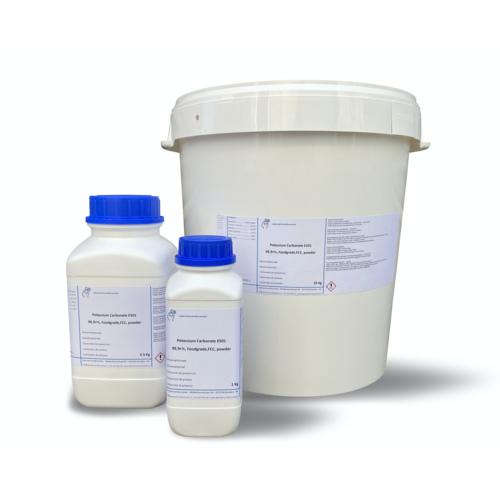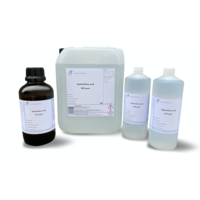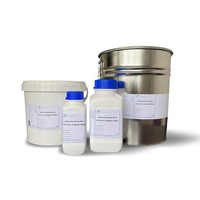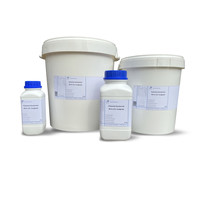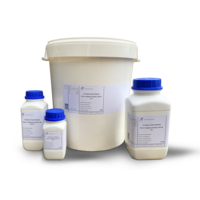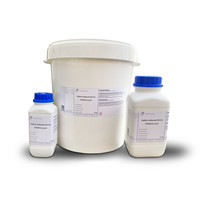You have no items in your shopping cart
Potassium carbonate 99,9+%, foodgrade, FCC, Powder
- Buy 2 and save 5%
- Buy 5 and save 10%
What is Potassium Carbonate?
Potassium carbonate, K2CO3, is an alkali and the potassium salt of carbonic acid. It forms a white, hygroscopic powder with a melting temperature of 891 ° C and a density of 2.428 gcm-3. The name potash comes from the old method of enriching potassium carbonate from plant ash (especially wood but also seaweed ash) by extracting it. wash with water (hence the name as "lye salt") and then evaporate in pots (pots). The traditional name was also the inspiration for the English names potash and potassium, where potash contains many mineral potassium salts (eg potassium chloride) and can be better translated with potassium salt.
Applications:
- Additive in the manufacture of glass
- Additive for soft soaps
- Manufacture of potash glasses
- Manufacture of colors
- Manufacture of photographic developers
- Manufacture of fertilizers (potassium-containing component)
- Anhydrous potassium carbonate is occasionally used as a drying agent in the laboratory.
- Raising agent for flat cakes (biscuits and gingerbread, especially Christmas bakery) and dough with a high sugar content.
- Additive to cocoa as an acidity regulator
- Neutralizing agent when using hydrochloric acid (E 507) as a flavor enhancer.
- Quick-drying raisins: by removing the natural wax layer of the grapes, the moisture evaporates more easily.
- Basic product for other potassium compounds.
- To remove crusts from pots: place 1 tablespoon on the crust in the pot, leave overnight and boil the next day with a cup of water; the remains are flaked off the bottom of the pot.
- Plaster cast release agent (sculpture)
- Electrolyte component in molten carbonate fuel cells
- Approved tobacco additive for snuff according to tobacco legislation
- Additive for taking certain addictive substances
- Additive in some hand soap liquid soap
- environmentally friendly de-icing agent (instead of road salt) for black ice on roads and sidewalks
- Since it always contains radioactive potassium-40, potassium can be used for student experiments on radioactivity
- For centuries, potassium carbonate in the form of beech ash was used in Europe to make clothes and other textiles from linen and later also cotton. The ashes are placed in small bags and added to a wooden barrel filled with layered laundry. Pouring hot water over the bag released a lye that had a cleansing and light bleaching effect. The lye was then washed out at the wash fountain or by the river. With the advent of curd soap and later artificial cleansers at the beginning of the 20th century, this method was obsolete.
- Part of fire extinguishing equipment
Technical confront
Potash
Empirical formula K2CO3
Molar mass (M) 138.21 g/mol
Density (D) 2.43 g/cm³
Melting point (mp) 891°C
WGK 1
CAS no. 584-08-7
EC no. 209-529-3
$$$$$
Hazard statements
H315 Causes skin irritation
H319 Causes serious eye irritation
H335 May cause respiratory irritation
Precautions - prevention
P280 Wear protective gloves / eye protection.
Precautions - response
P302 + P352 IF ON SKIN: Wash with plenty of water.
P305 + P351 + P338 IF IN EYES: Rinse cautiously with water for a period of time
amount of minutes; remove contact lenses, if possible; keep rinsing.
P337 + P313 If eye irritation persists: Get medical advice / attention.

%%%%%
| MSDS Kaliumcarbonaat (NL) |
| MSDS Kaliumcarbonat (DE) |
| MSDS Potassium carbonate (EN) |
| MSDS Carbonate de potassium (FR) |
| MSDS Carbonato de potasio (ES) |

